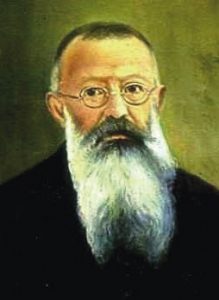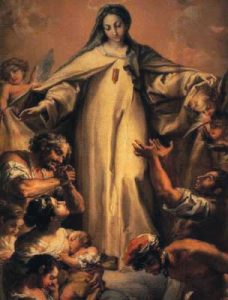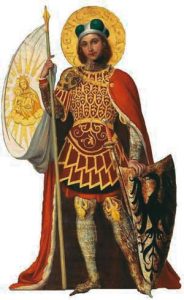September Saints
The story of Our Lady of Ransom is that of Saint Peter Nolasco, born in Languedoc about 1189. He conceived the idea of establishing a religious order for the redemption of captives seized by the Moors, and being cruelly tormented in their African prisons to make them deny their faith. On August 1, 1218 the Blessed Virgin appeared to Saint Peter, to his confessor, Raymund of Peñafort, and to King James I, and through these three servants of God established a work of the most perfect charity, whose members would undertake to deliver Christian captives and offer themselves, if necessary, as payment.
Word of the apparition soon spread over the entire kingdom, and the blessing of the bishop of Barcelona was sought. The habit was bestowed on Peter, who pronounced the solemn vow to give himself as a hostage if required.
The Order, thus solemnly established in Spain, was approved by Gregory IX under the name of Our Lady of Mercy and spread rapidly. Eventually a feast day was instituted and observed on September 24, first in the religious order, then in Spain and France, and eventually to the entire Church.
Holy Mother of Ransom, open our hearts to the refugees in our midst.
(Source: http://campus.udayton.edu/mary/ladyransom.html)
Wenceslas was born near Prague and raised by his grandmother, St. Ludmilla, until her murder by his mother, the pagan Drahomira, who assumed the regency over Bohemia after her husband’s death in about 920. Her rule was so arbitrary and cruel that Wenceslas was compelled on behalf of his subjects to overthrow her and assume power for himself.
A devout Christian, he proved a gifted ruler and a genuine friend of the Church. German missionaries were encouraged, churches were built, and Wenceslaus perhaps took a personal vow of poverty. His defeat by an invading king of Germany and his pro-Christian policies led a group of non-Christian nobles to conspire against him. On 28 September 929, a group of knights, under the leadership of Wenceslas’ brother Boreslav, assassinated him on the doorstep of a church. Virtually from the moment of his death, Wenceslas was considered a martyr and venerated as a saint.
Saint Wenceslas, give us courage in the face of persecution.
(Source: http://www.catholic.org/saints/saint.php?saint_id=2040)
 Blessed Paolo Manna (1872-1952)
Blessed Paolo Manna (1872-1952)
Paolo Manna was born in Avellino, Italy. He was educated in Avellino and Naples, and then enrolled at the Gregorian University in Rome. While there, he heard the call to the priesthood and entered the Theology Seminary of the Institute for Foreign Missions in Milan. In 1894, he was ordained a priest.
The following year, he was sent to the mission of Toungoo in Eastern Burma, where he worked for ten years, after which illness forced him to return to Italy. His missionary experience inspired him to work energetically towards fostering missionary zeal among the clergy and the faithful. To this end, he founded the Missionary Union of the Clergy in the firm belief that a mission-minded clergy would make all Catholics missionaries. He saw the Union as a radical solution to the problem of involving Catholics in the apostolate.
In an effort to foster the missionary vocations in Southern Italy, the Sacred Congregation for the Propagation of the Faith asked Father Manna to establish a seminary for foreign missions, a foundation he had long encouraged and promoted.
Father Paolo was a man driven. His zeal for mission led him to form the Pontifical Institute for the Foreign Missions. Always open to the movements of the Spirit, he envisioned innovative methods of missionary work which presaged developments at the Second Vatican Council. He wrote books and booklets encouraging the growth of a missionary spirit among Catholics.
Fr Paolo’s greatest legacy is the example he left behind: he was driven by an overwhelming passion for the missions that sickness, suffering and setbacks could never diminish. A biographer called him a burning soul, and his motto was: All the Church for all the world.
To the end, he exhorted his brethren: …be holy missionaries and, for the part that concerns you, your apostolic duty will have been done to the full… at the end of your days you will be able to say with the Divine Redeemer: “Father, I kept those you had given me true to your name. I have watched over them and not one is lost” (John 17.12).
Blessed Paolo, instil in us a missionary spirit.
(Source: Internet – various)


 Entries(RSS)
Entries(RSS)